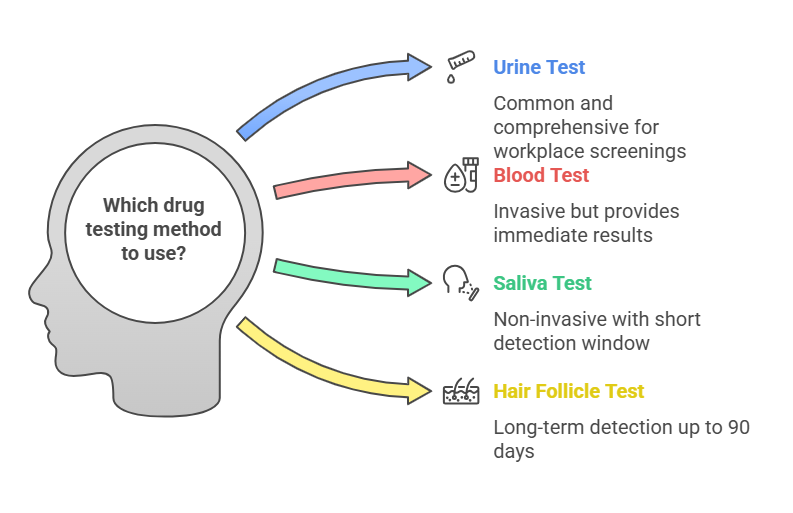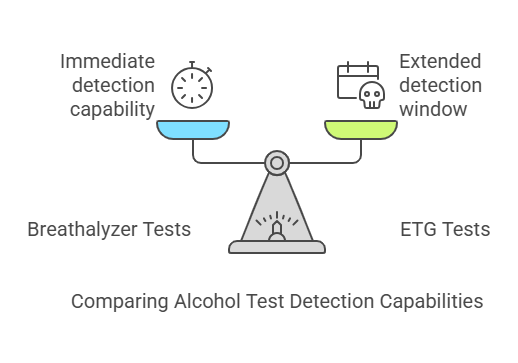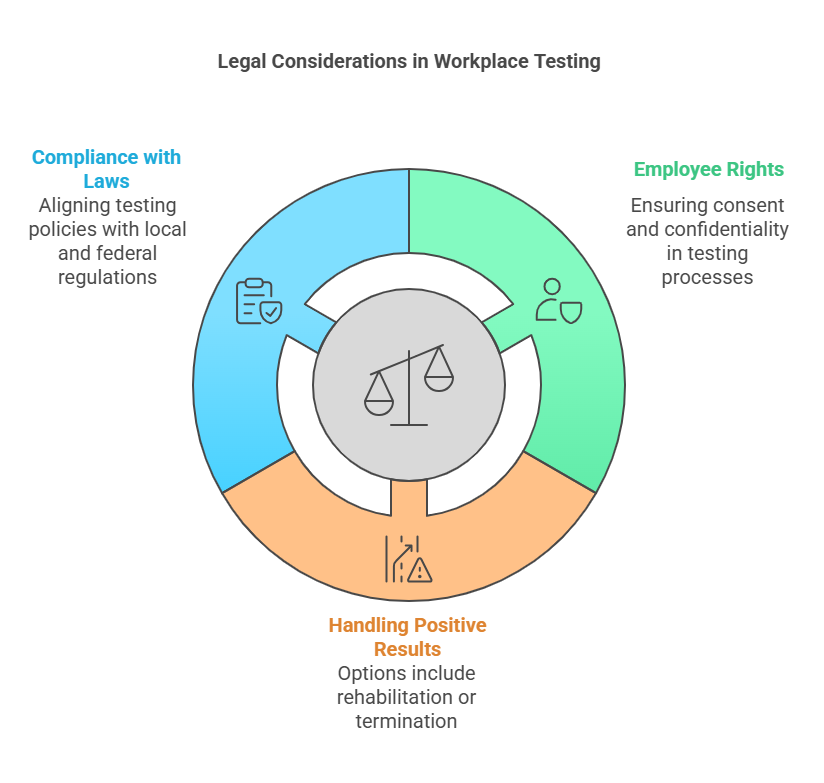Things to Know About Alcohol and Drug Screening

Does Alcohol Appear on Drug Screens? Understanding What to Expect
What is Drug Screening?
Drug screening refers to the process of testing biological samples, such as urine, blood, saliva, or hair, for the presence of drugs or alcohol. This process is used in many situations, including pre-employment testing, random testing, post-incident testing, and for legal purposes such as monitoring individuals on probation or parole.
The purpose of drug screening is to ensure that individuals are not under the influence of substances that could impair their performance or safety. It also plays a significant role in industries that require employees to be drug-free, especially in safety-sensitive sectors like transportation, healthcare, and construction.
Common Types of Drug Tests

There are various drug tests used to detect substances in the body. Each test has its own detection window and sensitivity, with some being more effective for detecting specific substances.
- Urine Drug Tests: The most common method, especially in workplace screenings. Urine tests can detect a wide range of substances, including marijuana, cocaine, amphetamines, opioids, and sometimes alcohol.
- Blood Tests: These are more invasive and can provide an immediate snapshot of a person’s blood alcohol content (BAC) or recent drug use. Blood tests are often used in legal and medical situations.
- Saliva Tests: These tests are non-invasive and detect drugs used within a shorter timeframe (usually 1-2 days before the test).
- Hair Follicle Tests: Used to detect drug use over a longer period (up to 90 days), these tests are often used for long-term monitoring.
Does Alcohol Show Up in Standard Drug Tests?
Alcohol is not typically included in standard drug screening panels, such as the commonly used 5-panel urine test. These panels typically screen for illicit drugs like marijuana, cocaine, amphetamines, and opioids, but not alcohol. However, alcohol can still be detected through specific tests designed to measure its presence in the body.
Breathalyzer Tests
One of the most common ways to detect alcohol is through a breathalyzer test. This is commonly used by law enforcement in roadside checks or by employers in safety-sensitive industries. Breathalyzers measure the blood alcohol content (BAC) in a person’s breath. If a person has consumed alcohol, their BAC can be measured immediately, with results available in real-time.
ETG (Ethyl Glucuronide) Tests
An ETG test is a more specialized test that looks for traces of ethyl glucuronide, a byproduct of alcohol metabolism. This test is more sensitive and can detect alcohol consumption up to 80 hours after the individual has consumed alcohol, depending on various factors such as metabolism and frequency of use.
Urine, Blood, and Saliva Tests
While standard drug tests typically don’t include alcohol, specific alcohol testing can be done using urine, blood, or saliva samples. The detection window for alcohol varies:
- Urine Tests: Alcohol can be detected in urine for 12-24 hours after consumption, although the detection window may vary based on individual factors like metabolism.
- Blood Tests: Alcohol is detectable in the blood for 6-12 hours.
- Saliva Tests: Alcohol can be detected in saliva for up to 1-2 days.
How Alcohol Affects Drug Testing
Alcohol can also impact the results of other drug tests in indirect ways:
- False Positives or Negative Results: Alcohol consumption may affect liver enzymes and other metabolic processes, which could influence the results of drug tests for substances like marijuana or opioids. In some cases, alcohol may interact with medications, leading to false positive or negative results.
- Chronic Alcohol Consumption: Those who consume alcohol heavily over a long period may experience changes in their liver enzymes or overall metabolism, which can affect how drugs are processed and detected in the body.
While alcohol is generally not part of routine drug testing, its presence in the system can still play a role in drug testing outcomes.
Types of Alcohol-Specific Drug Tests

As mentioned earlier, alcohol is not commonly tested for in standard drug screenings, but there are several specific tests designed to detect alcohol use.
1. Breathalyzer Tests
A breathalyzer test is one of the most immediate ways to check for alcohol use. It measures the blood alcohol concentration (BAC) in a person’s breath. Breathalyzer tests are commonly used in both law enforcement (e.g., roadside checks for DUI) and some workplace screenings, particularly in safety-sensitive environments.
Breathalyzer tests are highly effective for detecting alcohol levels immediately after consumption. However, they have a limited detection window, typically only measuring alcohol consumption within a few hours of testing.
2. ETG Tests
An ETG test is more specialized and can detect alcohol use up to 80 hours after consumption. This test detects the presence of ethyl glucuronide, a metabolite of alcohol. It is often used in situations where alcohol use needs to be tracked over a more extended period, such as for individuals in recovery programs or in legal monitoring situations.
3. Hair Follicle Testing
While hair follicle testing is primarily used to detect drug use over a period of months, it is not the primary method for alcohol testing. However, some labs may be able to detect chronic alcohol use through hair follicle analysis, though this is less common.
When Alcohol is Tested for in the Workplace
Alcohol testing in the workplace is not as common as drug testing, but there are specific situations where employers might choose to conduct alcohol screenings:
- Post-Incident Testing: If an employee is involved in a workplace accident, employers may require alcohol testing as part of the investigation. This helps ensure that the individual was not under the influence at the time of the incident.
- Random or Suspicion-Based Testing: In some industries, such as transportation, construction, and healthcare, alcohol testing may be conducted randomly or when there is suspicion of impairment.
- Safety-Sensitive Industries: Employers in safety-sensitive industries may be required to perform alcohol testing in order to comply with regulatory standards. For example, DOT (Department of Transportation) regulations require alcohol testing for certain transportation workers, including truck drivers, train operators, and airline personnel.
How ExactBackgroundChecks.com Helps with Alcohol and Drug Testing
ExactBackgroundChecks.com offers a comprehensive range of drug and alcohol testing services tailored to meet the needs of both employers and individuals. Whether you are looking to screen employees during the hiring process, conduct random drug tests, or perform post-incident testing, ExactBackgroundChecks.com provides accurate and reliable testing services.
Why Choose ExactBackgroundChecks.com?
- Reliable Testing: ExactBackgroundChecks.com partners with certified labs to ensure that alcohol and drug screenings are both accurate and legally compliant.
- Confidentiality: The platform ensures confidentiality and privacy for all individuals undergoing drug and alcohol testing, which is essential for compliance with privacy regulations.
- Customizable Testing Programs: Employers can create customized drug and alcohol testing programs that align with their business needs, including pre-employment screenings, random tests, and incident-related testing.
- Compliance with Industry Standards: ExactBackgroundChecks.com helps employers meet legal requirements and regulatory standards, ensuring that testing procedures are up to date and in compliance with workplace laws.
By utilizing the services of ExactBackgroundChecks.com, both individuals and employers can ensure that alcohol and drug screenings are conducted accurately and efficiently, helping to maintain a safe and compliant workplace environment.
Legal Aspects of Alcohol and Drug Screening

There are several legal considerations when it comes to alcohol and drug testing, especially in the workplace. Here are some important legal aspects to be aware of:
Workplace Drug Testing Laws
Federal, state, and local regulations govern how alcohol and drug testing should be handled in the workplace. Laws like the Americans with Disabilities Act (ADA) and Equal Employment Opportunity Commission (EEOC) guidelines address potential discrimination and privacy issues related to alcohol and drug testing.
Employee Rights and Privacy
Employees have legal rights when it comes to alcohol and drug testing. For example, employees must give consent before being tested, and their personal information must be kept confidential under privacy laws. Employers must follow legal protocols when conducting screenings to ensure that they do not violate employees’ rights.
Handling Positive Alcohol Test Results
If an employee fails an alcohol test, the employer may have legal obligations to follow specific protocols. In some cases, this may involve rehabilitation programs, or termination if the company has a strict policy on substance abuse. Employees also have the right to contest a failed test if they believe the results were inaccurate.
Alcohol Testing in the Workplace: Legal Framework
While alcohol testing is permitted in many workplaces, the legality of alcohol testing depends on the jurisdiction and the nature of the workplace. Employers should ensure that their alcohol testing policies align with local and federal laws, including ensuring that employees are not subjected to random testing without just cause.
Frequently Asked Questions (FAQs)
Does alcohol show up on a routine drug test?
Alcohol is not typically part of routine drug tests, but specialized tests (like breathalyzer tests or ETG tests) can detect alcohol use.
How long does alcohol stay in your system for drug testing?
Alcohol can be detected for up to 12-24 hours in urine, 6-12 hours in blood, and 1-2 days in saliva, depending on the type of test.
Can I fail a drug test for alcohol even if it’s not a scheduled part of the test?
Yes, alcohol can show up unexpectedly if an alcohol-specific test, such as a breathalyzer or ETG test, is conducted.
Is it legal for employers to test for alcohol?
Yes, employers can test for alcohol in certain circumstances, especially in safety-sensitive industries. However, they must follow legal and regulatory requirements.
What should I do if I fail an alcohol test at work?
If you fail an alcohol test at work, consult your employer’s substance abuse policy, as it may involve rehabilitation programs or disciplinary action.
Does alcohol show up on a routine drug test?
Alcohol is not typically part of routine drug tests, but specialized tests (like breathalyzer tests or ETG tests) can detect alcohol use.
How long does alcohol stay in your system for drug testing?
Alcohol can be detected for up to 12-24 hours in urine, 6-12 hours in blood, and 1-2 days in saliva, depending on the type of test.
Can I fail a drug test for alcohol even if it’s not a scheduled part of the test?
Yes, alcohol can show up unexpectedly if an alcohol-specific test, such as a breathalyzer or ETG test, is conducted.
Is it legal for employers to test for alcohol?
Yes, employers can test for alcohol in certain circumstances, especially in safety-sensitive industries. However, they must follow legal and regulatory requirements.
What should I do if I fail an alcohol test at work?
If you fail an alcohol test at work, consult your employer’s substance abuse policy, as it may involve rehabilitation programs or disciplinary action.
Conclusion
To summarize, alcohol does not typically show up in standard drug screenings unless specifically tested for. Specialized tests like breathalyzers or ETG tests can detect alcohol, even several hours or days after consumption. Employers may test for alcohol in specific situations, particularly in safety-sensitive industries.
For accurate and reliable alcohol and drug testing, ExactBackgroundChecks.com provides comprehensive services for both employers and employees, ensuring compliance with legal standards and a safe workplace environment.



